Gary Palmer’s primary opponents not convinced that he would be a conservative speaker
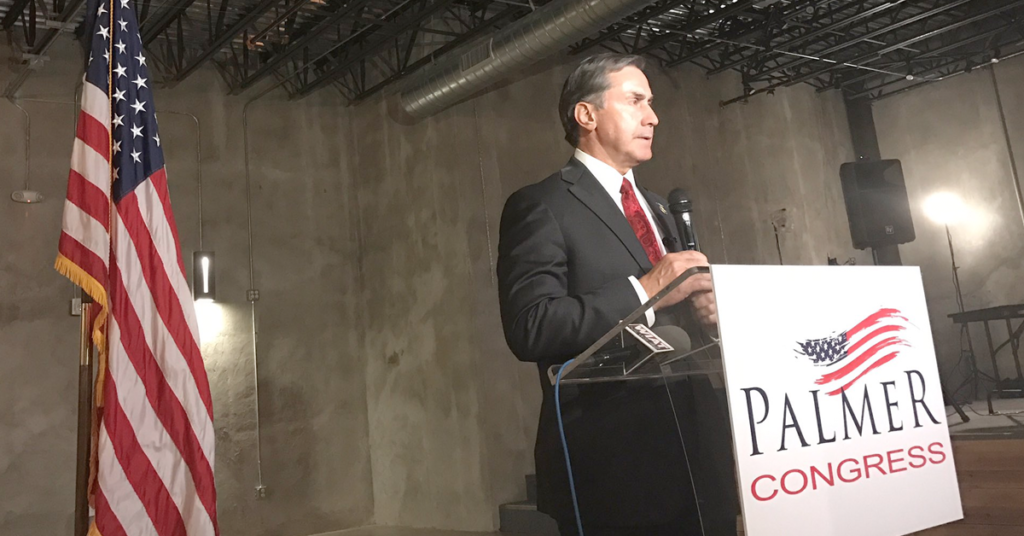
On Sunday, Congressman Gary Palmer (R-AL06) announced that he will seek to be elected as the next Speaker of the United States House of Representatives. However, his two primary opponents in Alabama remain skeptical about Palmer’s commitment to conservative principles. Palmer is facing two Republican primary opponents, Ken McFeeters and Gerrick Wilkins. Alabama Today spoke with McFeeters on Sunday about Palmer and his campaign to be Speaker of the House. McFeeters is an independent insurance agent. “Congressman Palmer might just get the Speakership as Congress has proven it doesn’t want a true conservative by not selecting Jim Jordan, so Gary might be their man,” McFeeters said. “More status quo, more multi-billion-dollar socialist spending bills/CARES Acts, more shutdowns, more “corporatism.” If Congressman Palmer is selected, and I think that’s what Congress wants.” McFeeters did not think that a Speaker Palmer would excite the Republican electorate. “I wish Congress did what the people wanted on occasion,” McFeeters added. “A side note. Gary’s own constituents cannot trust him because he broke his term limits pledge. Thus, why would his colleagues trust him as their next Speaker?” On Monday, Alabama Today spoke with Wilkins – a longtime businessman who declared his candidacy for House District six late last week. “We do need to get the Speaker’s race resolved, but I think there are better choices than Gary Palmer,” Wilkins said. “I think Byron Donalds is the best choice in the Speaker’s race.” “Gary started as a strong conservative, but he has lost his way,” Wilkins said. “He now sides with the establishment more than with the people. He even opposed the parent’s bill of rights.” Wilkins objected to Palmer’s decision earlier this year to renounce his term limits pledge and run for a sixth term. “I think what you say matters,” Wilkins said. “I have been in business for 24 years, and now I am devoting considerable time and resources to this race.” Palmer is facing eight opponents in his bid to be the next Speaker of the House. The House Republican Conference will meet Monday evening to select a new nominee for the open Speaker of the House race. The last two nominees, Jim Jordan and Steve Scalise could not unite the caucus. It takes a simple majority of the Conference to win the Republican nomination, but winning the Speaker of the House position requires 217 Republicans to vote in favor of the nomination. With ultra-conservatives and more mainstream Republicans refusing to vote for the Conference’s nominee, it has been difficult for Republicans to elect a Speaker. Palmer will still have to face McFeeters and Wilkins in the Republican primary. The major party primaries are on March 5. To connect with the author of this story or to comment, email brandonmreporter@gmail.com.
Republicans announce nine new speaker candidates
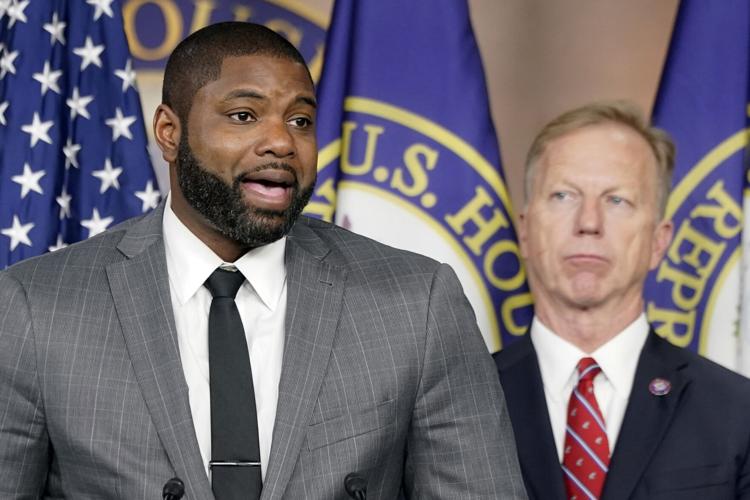
By Casey Harper | The Center Square Nine new Republican lawmakers have thrown their hat in the ring to become the next speaker of the U.S. House. Republican Conference Chair Rep. Elise Stefanik released the list of candidates, who had until noon Sunday to announce their candidacy. The list, which Stefanik posted on X, formerly known as Twitter, is as follows: The new list of candidates comes after former House Speaker Kevin McCarthy, R-Calif., was ousted from the role when Rep. Matt Gaetz, R-Fla., filed a motion to vacate. Then, Majority Leader Steve Scalise, R-La., was the party’s choice to become speaker, but he withdrew when he was unable to get the support he needed. House Judiciary Chair Rep. Jim Jordan, R-Ohio, was next in line and worked for several days to get the needed 217 votes to become speaker. However, at least 20 Republicans voted against him across his three floor-vote attempts, and on Friday, his nomination was revoked. Some of the candidates have more support than others. Donalds’ announcement drew more attention than some others. Emmer has been a rumored pick for speaker as well. However, conservative Republicans have expressed frustration with moderate Republicans for rejecting Jordan, who had significant support with the Republican base but was seen as a hardline conservative who questioned the results of the 2020 presidential election. “The most popular Republican in Congress was just knifed in an anonymous vote in a secret closed-door meeting in the basement of the Capitol,” Gaetz wrote on X Friday. “This is the Swamp at work.” Meanwhile, some more moderate Republicans have expressed frustration with Gaetz and do not want to reward his ousting of McCarthy with an aggressive conservative pick. As The Center Square previously reported, Jordan sparked pushback from his own party on Thursday after reports surfaced that he said behind closed doors he would back the speaker pro Tempore, U.S. Rep. Patrick McHenry, R-N.C., for a limited temporary speakership role so the government could be funded and other key legislative goals hit. The federal government faces a partial shutdown in November, and there is increasing pressure to send more funds for the Ukraine and Israel wars. President Joe Biden called on Congress to pass a spending package of $105 billion for those wars as well as some border funding and money for Taiwan, which national security experts say China could invade at any time. Jordan later addressed reporters, announcing he would drop that plan and instead hold another vote. That plan still has potential to take effect. While many Republicans have expressed opposition to the idea, Democrat Minority Leader Hakeem Jeffries has seemed open to the idea when talking with reporters. Republished with the permission of The Center Square.
AG Merrick Garland takes fire from Republicans
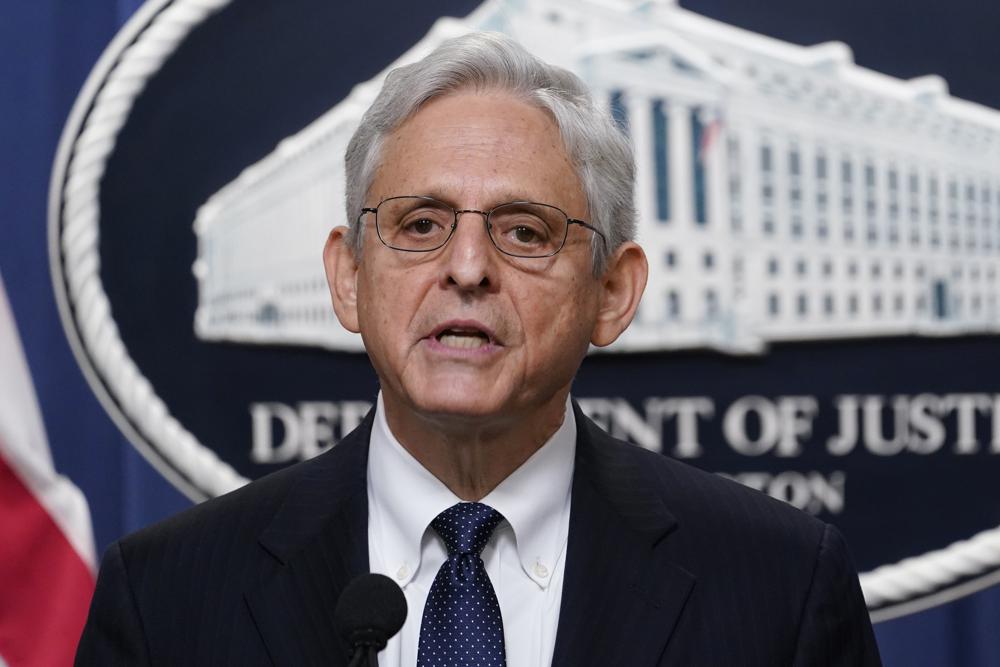
House Republicans peppered Attorney General Merrick Garland with questions during a hearing Wednesday about the probe into Hunter Biden, the president’s son. As The Center Square previously reported, two IRS whistleblowers testified before Congress that the DOJ abused its power and interfered in their inquiry into Hunter Biden’s alleged tax crimes. Notably, they testified that the investigation was slowed so that the statute of limitations could run out on some charges. Supervisory Special Agent Gary Shapley and Criminal Investigator Joseph Ziegler, both IRS employees with a combined 27 experience years at the agency, testified before Congress that Assistant U.S. Attorney Lesley Wolf helped block investigators’ plan for an interview of the president and a search warrant of the Biden residence in Delaware. “Everyone knows why they did it,” House Judiciary Chair Rep. Jim Jordan, R-Ohio, said at the hearing. “Those tax years, that… involved the president. It’s one thing to have a gun charge in Delaware. That doesn’t involve the president of the United States. But Burisma? That goes right to the White House.” Garland seemed to preempt some of these criticisms in his opening statement, saying he was not obligated to do the bidding of the president or Congress. He declined to give specific answers to many of the Republicans’ questions, including around the federal indictment of former President Donald Trump. “Our job is to pursue justice, without fear or favor,” Garland said in his opening statement. “Our job is not to do what is politically convenient. Our job is not to take orders from the president, from Congress, or from anyone else, about who or what to criminally investigate. As the President himself has said, and I reaffirm today: I am not the president’s lawyer. I will also add I am not Congress’s prosecutor.” That reference to Congress’s prosecutor is an apparent reference to Republicans’ frustrations with the DOJ for not prosecuting Hunter Biden more aggressively. House Oversight Committee Chair Rep. James Comer, R-Ky., has released a steady stream of evidence in recent months alleging that Hunter Biden was involved in an overseas “bribery scheme” and that his father knew about it. House Speaker Kevin McCarthy, R-Calif., who kicked off an impeachment inquiry on the same issue, pointed to about 150 U.S. Treasury Department suspicious activities reports filed by the agency around Hunter Biden’s dealings as well as bank records and the testimony from IRS whistleblowers who said the Biden family and associates received around $20 million from entities in adversarial nations. Special counsel David Weiss indicted Hunter Biden earlier this month over a gun purchase he made in 2018 after his plea deal unexpectedly fell through. Hunter Biden, who is also expected to face tax charges, was ordered by a federal magistrate judge on Wednesday to appear in court at his Oct. 3 hearing. Garland has taken fire over a string of incidents where critics say the agency has wrongly weaponized its power and targeted Americans, including working with social media groups to censor American posts and allegedly being more aggressive in prosecuting conservatives and right-leaning groups. “As someone who grew up in the Soviet Union, I’m disturbed by the fact that so many hardworking Americans—including my constituents—are afraid of political persecution by our own government,” said Rep. Victoria Spartz, R-Ind. “Unfortunately, it does not seem like AG Garland is.” House Committee on Oversight and Accountability Chairman James Comer, R-Ky., and Rep. Byron Donalds, R-Fla., recently sent a letter to the National Archives and Records Administration requesting travel records for Air Force Two after allegations that Hunter Biden may have used the vice president’s plane for his overseas deals when his father held that position in the Obama administration. Republished with the permission of The Center Square.
Republicans set to push mail ballots, voting methods they previously blasted as recipes for fraud

After years of criticizing mail voting and so-called ballot harvesting as ripe for fraud, Republicans at the top of the party want to change course. They are poised to launch aggressive get-out-the-vote campaigns for 2024 that employ just those strategies, attempting to match the emphasis on early voting Democrats have used for years to lock in many of their supporters well ahead of Election Day. The goal is to persuade voters who support GOP candidates that early voting techniques are secure and to make sure they are able to return their ballots in time to be counted, thus putting less pressure on Election Day turnout efforts. It marks a notable shift from the party’s rhetoric since 2020 when then-President Donald Trump was routinely sowing doubt about mail voting and encouraging his voters to wait and vote in-person on Election Day. As recently as last year, Republican activists peddling the stolen election narrative were telling GOP voters who received mail ballots to hold onto them and turn them in at their polling place on Election Day rather than use mail or drop boxes. Now Trump is asking donors to chip in for his “ballot harvesting fund” – saying in a fundraising email, “Either we ballot harvest where we can, or you can say goodbye to America!” Republicans say the shift is needed to ensure GOP victories up and down the 2024 ballot, arguing they cannot afford to give Democrats any advantage. At the same time, they acknowledge skepticism from many of their own voters conditioned by false claims of widespread voter fraud from Trump and others. Across the country, Republican-controlled legislatures have acted against early voting — shortening windows for returning mail ballots, banning or limiting the use of drop boxes, and criminalizing third-party ballot collection. In announcing a “Bank Your Vote” initiative for 2024, Republican National Committee Chairwoman Ronna McDaniel said the party “has never said ‘don’t vote early,‘” but acknowledged the GOP will have to work to shift voters’ perceptions. “That certainly is a challenge if you have people in your ecosystem saying, ‘Don’t vote early or don’t vote by mail,’ and those cross messages do have an impact,” McDaniel told reporters Wednesday. “I don’t think you’re seeing that heading into 2024. I think you’re seeing all of us singing from the same songbook.” The nationwide GOP plan emphasizes “in-person early voting, absentee voting, and ballot harvesting where legal,” while also pledging “to fight against bad ballot harvesting laws.” Republicans use the term to describe when someone else returns a mailed ballot on behalf of another voter, especially third parties that gather multiple ballots. McDaniel emphasized she remains opposed to ballot collection, and she said the party would deploy an army of poll watchers and election monitors to reassure Republican voters that their ballots will be protected. “Do I think it’s the most secure way of voting? No,” McDaniel said. “But if it’s the law, we’re going to have to do it just like the Democrats are.” The challenge will be providing a consistent message that reassures GOP voters. The same day McDaniel announced her initiative, Republicans in Congress were holding a hearing considering legislation that, among other things, would ban ballot collection in the District of Columbia. GOP state lawmakers around the country have chipped away at advanced voting opportunities since 2020. Some state and local election Republicans have gone further, advocating for just a single day of voting. After the 2020 presidential election, the movie “2000 Mules” was a popular video that made various debunked claims about mail ballots, drop boxes, and ballot collection. Even the co-chair of the new GOP strategy, U. S. Rep. Byron Donalds, R-Fla., has been a critic. In November, he issued a call on social media to “End ballot harvesting.” Nonetheless, McDaniel noted that Republican presidential candidates, including Trump, have been talking about the importance of advance voting and ballot collection. Florida Gov. Ron DeSantis, a high-profile GOP contender, recently told a voter he planned to launch his own “ballot harvesting” effort, according to video posted online by a Washington Post reporter. DeSantis said he wasn’t going to “fight with one hand tied behind my back.” The Trump and DeSantis campaigns did not respond to messages seeking details about ballot collection plans. Florida is among the mostly Republican-led states that have sought to ban or limit the practice in recent years, despite the GOP’s reliance there on older, more conservative voters who prefer voting methods other than casting Election Day ballots. Since the 2020 election, lawmakers in 31 states have introduced 124 bills that would restrict third-party ballot returns, according to data collected by the Voting Rights Lab, which tracks voting-related legislation in the states. Of those, 14 bills in 11 states have been enacted. That includes one DeSantis himself signed that makes it a felony for an individual to collect more than two mail ballots other than the person’s own or one belonging to an immediate family member. While some states are silent on the issue, 31 states allow someone other than the voter to return a ballot on behalf of another voter. Nine limit how many ballots one person can return, according to the National Conference of State Legislatures. Many states limit ballot handling to a family member, household member, or caregiver. In California, efforts to lock in the early vote could be decisive next year in a string of U.S. House districts, most of them in the southern California suburbs, that are expected to play a pivotal role in determining control of the chamber. California is a Democratic stronghold, but Republicans retain pockets of strength across rural and small-town areas and the Central Valley farm belt, while the state’s suburban congressional districts have yielded many tight races in recent election cycles. As many as nine congressional seats are considered competitive, and several races will play out in districts won by President Joe Biden but where the seat is held by a Republican. Each of California’s 22 million registered voters is mailed a ballot one month before Election Day. “In any close election, the ability to capture absentee votes becomes extremely important, especially in a
Kevin McCarthy makes big gains for speaker, but still falls short
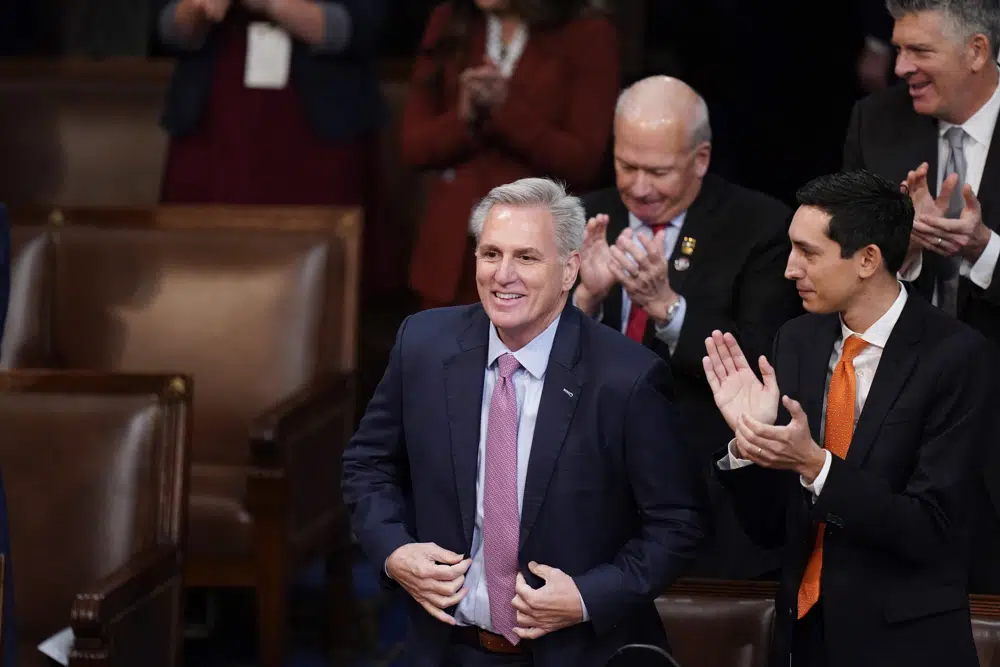
Republican leader Kevin McCarthy flipped 15 colleagues to support him in dramatic votes for House speaker on Friday, making extraordinary gains on the fourth day and the 12th and 13th ballots of a grueling standoff that was testing American democracy and the Republicans’ ability to govern. The changed votes from conservative holdouts, including the chairman of the chamber’s Freedom Caucus, put McCarthy closer to seizing the gavel for the new Congress — but not yet able. The stunning turnaround came after McCarthy agreed to many of the detractors’ demands — including the reinstatement of a longstanding House rule that would allow any single member to call a vote to oust him from office. That change and others mean the job he has fought so hard to gain will be weakened. After McCarthy won the most votes for the first time on the 12th ballot, a 13th was swiftly launched, this time just between McCarthy and the Democratic leader, with no nominated Republican challenger to siphon GOP votes away. But six GOP holdouts still cast their ballots for unnominated others, denying him the majority needed. The showdown that has stymied the new Congress came against the backdrop of the second anniversary of the January 6, 2021, attack on the Capitol, which shook the country when a mob of then-President Donald Trump’s supporters tried to stop Congress from certifying the Republican’s 2020 election defeat to Democrat Joe Biden. A few minutes before voting began in the House chamber, Republicans tiring of the spectacle walked out when one of McCarthy’s most ardent challengers railed against the GOP leader. “We do not trust Mr. McCarthy with power,” said Republican Matt Gaetz of Florida as colleagues streamed out of the chamber in protest of his remarks. Contours of a deal with conservative holdouts who have been blocking McCarthy’s rise emerged, but an agreement had seemed still out of reach after three dismal days and 11 failed votes in a political spectacle unseen in a century. But an upbeat McCarthy told reporters as he arrived at the Capitol Friday morning, “We’re going to make progress. We’re going to shock you.” One significant former holdout, Republican Scott Perry, chairman of the conservative Freedom Caucus, tweeted after his switched vote for McCarthy: “We’re at a turning point.” But several holdouts remained. The final 12th vote tally: McCarthy, 213 votes; Democrat Hakeem Jeffries 211. Other Republicans Jim Jordan and Kevin Hern picked up protest votes. With 431 members voting, McCarthy was still a few votes short of a majority. When Rep. Mike Garcia nominated McCarthy for a 12th time, he also thanked the U.S. Capitol Police who were given a standing ovation for protecting lawmakers and the legislative seat of democracy on January 6. The agreement McCarthy presented to the holdouts from the Freedom Caucus and others centers around rules changes they have been seeking for months. Those changes would shrink the power of the speaker’s office and give rank-and-file lawmakers more influence in drafting and passing legislation. Even if McCarthy is able to secure the votes he needs, he will emerge as a weakened speaker, having given away some powers, leaving him constantly under threat of being voted out by his detractors. But he would also be potentially emboldened as a survivor of one of the more brutal fights for the gavel in U.S. history. At the core of the emerging deal is the reinstatement of a House rule that would allow a single lawmaker to make a motion to “vacate the chair,” essentially calling a vote to oust the speaker. McCarthy had resisted allowing a return to the longstanding rule that former Speaker Nancy Pelosi had done away with, because it had been held over the head of past Republican Speaker John Boehner, chasing him to early retirement. But it appears he had no other choice. The chairman of the chamber’s Freedom Caucus, Scott Perry of Pennsylvania, who had been a leader in Trump’s efforts to challenge his presidential election loss to Democrat Joe Biden, appeared receptive to the proposed package, tweeting an adage from Ronald Reagan, “Trust but verify.” Other wins for the holdouts include provisions in the proposed deal to expand the number of seats available on the House Rules Committee, to mandate 72 hours for bills to be posted before votes, and to promise to try for a constitutional amendment that would impose federal limits on the number of terms a person could serve in the House and Senate. Lest hopes get ahead of reality, conservative holdout Ralph Norman of South Carolina said: “This is round one.” It could be the makings of a deal to end a standoff that has left the House unable to fully function. Members have not been sworn in, and almost no other business can happen. A memo sent out by the House’s chief administrative officer Thursday evening said that committees “shall only carry out core Constitutional responsibilities.” Payroll cannot be processed if the House isn’t functioning by January 13. After a long week of failed votes, Thursday’s tally was dismal: McCarthy lost seventh, eighth, and then historic ninth, 10th, and 11th rounds of voting, surpassing the number from 100 years ago in the last drawn-out fight to choose a speaker. The California Republican exited the chamber and quipped about the moment: “Apparently, I like to make history.” Feelings of boredom, desperation, and annoyance seemed increasingly evident. Democrats said it was time to get serious. “This sacred House of Representatives needs a leader,” said Democrat Joe Neguse of Colorado, nominating his own party’s leader, Hakeem Jeffries, as speaker. What started as a political novelty, the first time since 1923 a nominee had not won the gavel on the first vote, has devolved into a bitter Republican Party feud and deepening potential crisis. Democratic leader Jeffries of New York won the most votes on every ballot but also remained short of a majority. McCarthy ran second, gaining no ground. Pressure has grown with each passing day for McCarthy to somehow find the votes he needs or
Rep. Barry Moore calls on Lloyd Austin to end military vaccine mandate
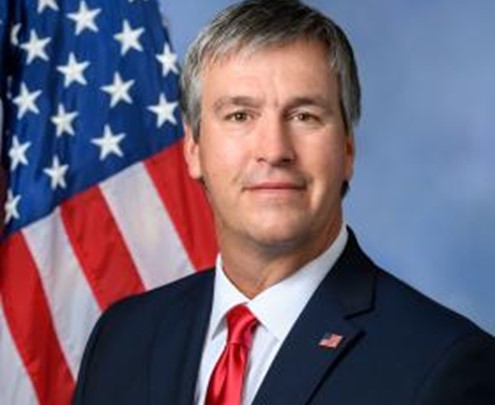
Barry Moore to join colleagues at D.C. hearing on ‘Bidenflation’

Congressman Andy Biggs will hold an off-site hearing on Tuesday to discuss what he terms “Bidenflation” and “Biden’s energy crisis.” Alabama Congressman Barry Moore will attend the hearing. The hearing will be at the Heritage Foundation in Washington D.C., from 3:00-5:00 pm EDT, and will feature nearly 20 prominent House Republican lawmakers. Four expert witnesses will provide testimony. According to the Heritage Foundation website, the group’s mission is to “formulate and promote public policies based on the principles of free enterprise, limited government, individual freedom, traditional American values, and a strong national defense.” According to the press release, this hearing will “examine the Biden Administration’s policies that have led to a disastrous economic and energy state for the country.” The hearing also aims to determine how Republicans in Congress can “hold Joe Biden more accountable for his reckless leadership.” Other congressional members attending the hearing are Reps. Chip Roy, Claudia Tenney, Dan Bishop, Marjorie Taylor-Greene, Lauren Boebert, Matt Gaetz, Louie Gohmert, Doug Lamalfa, Ralph Norman, Byron Donalds, Ben Cline, Yvette Herrell, Andrew Clyde, Bob Good, and Andy Harris. Witnesses include former Governor of Texas and former Department of Energy Secretary Rick Perry, Heritage Foundation Distinguished Fellow Stephen Moore, President of Western Energy Alliance Kathleen Sgamma, and Alex Epstein, President of the Center for Industrial Progress.
Mo Brooks introduces the Freedom to Fly Maskless Act

Congressman Mo Brooks has introduced a bill to prohibit the federal government from mandating masks, negative COVID-19 tests, and vaccinations on public transportation, including domestic flights. The Freedom to Fly Maskless Act aims to “limit the authority of the Department of Health and Human Services to regulate interstate commerce relating to communicable diseases, to amend title 49, United States Code, to limit the authority of the Federal Aviation Administration to regulate air commerce relating to communicable diseases.” In December, Southwest Airlines CEO Gary Kelly told the U.S. Senate Commerce, Science and Transportation Committee: “The statistics I recall is that 99.97% of airborne pathogens are captured by the [high efficiency particulate air] filtering system, and it’s turned over every two or three minutes. I think the case is very strong that masks don’t add much, if anything, in the air cabin environment. It’s very safe, and very high quality compared to any other indoor setting.” Original cosponsors include Reps. Paul Gosar, (AZ), Jeff Duncan (SC), Bob Gibbs (OH), Scott Perry (PA), Brian Mast (FL), Brian Babin (TX), Thomas Tiffany (WI), Mary Miller (IL), and Byron Donalds (FL). Brooks stated, “The American people are sick and tired of being dictated to by unelected Washington bureaucrats. As we have seen throughout the pandemic, the Department of Health and Human Services (HHS) has worked with other entities like the Transportation Security Administration (TSA) to impose masks, testing, and vaccination requirements. Unelected bureaucrats have falsely claimed the power to foist unnecessary and anti-science mandates on the American people. These mandates have resulted in good Americans being fired from their jobs, being jabbed with needles against their will, and even losing their businesses in some cases. It is time to throw off the heavy boot of tyranny that’s crushing the American spirit. Washington bureaucrats need reminding that America was founded on freedom and liberty.” Brooks concluded, “My bill, the ‘Freedom to Fly Maskless Act’ would prohibit unelected Washington bureaucrats from requiring masks, tests, and vaccinations on public transportation, including domestic flights. Each individual has the right to decide what health precautions they want to take when confronting Communist China’s lab-created virus or any future illness. Let me be clear, there is no amount of mandates and dictates that will end the COVID-19 pandemic. COVID-19 will continue to spread. Americans must learn to live with this virus because it’s going to be with us long-term. Continued mandates are not justified, and it’s long past time Americans return to our pre-pandemic lives.”


